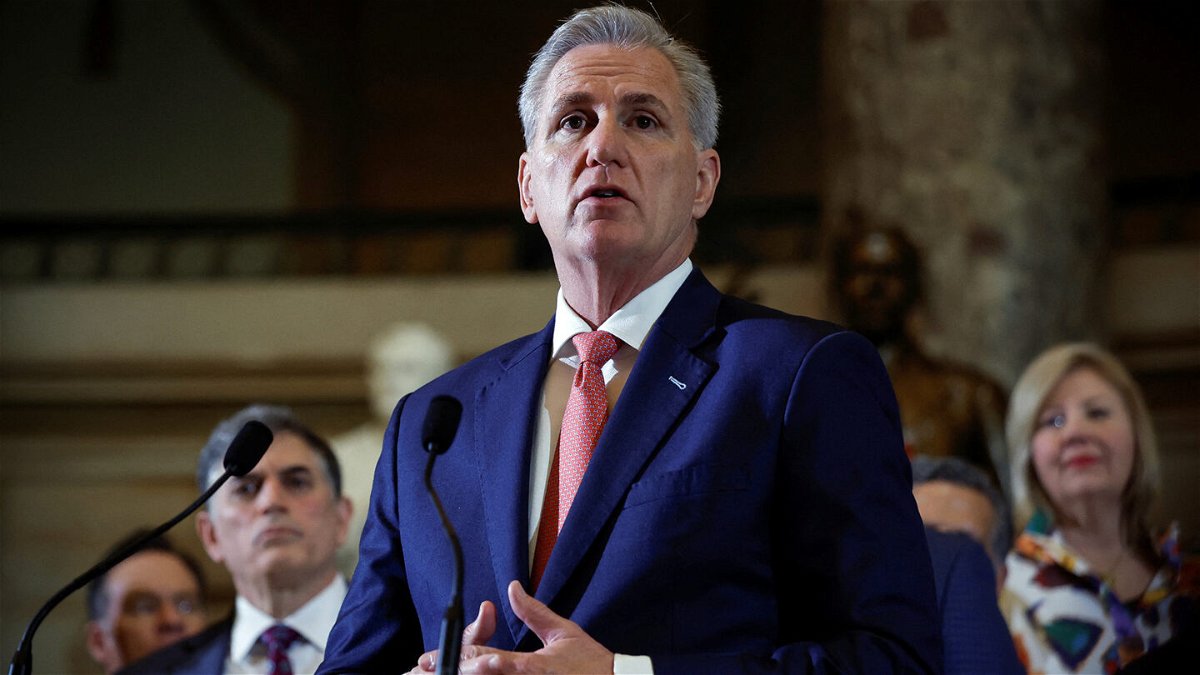House GOP prepared to move a fallback debt limit plan if White House refuses to negotiate

Speaker Kevin McCarthy
By Manu Raju, Chief Congressional Correspondent
Speaker Kevin McCarthy and his top lieutenants say they are actively preparing to move a party-line bill to raise the national debt limit if President Joe Biden continues to draw a firm line against talks with House Republicans to avoid the nation’s first-ever default.
The move would be a risky one. The GOP can only afford to lose four votes on any partisan plan, and thorny fiscal issues have long divided their party. House passage of a party-line bill would be difficult in the Democratic-led Senate where 60 votes would be needed to advance such a package.
But Republican leaders believe that their weeks of internal talks with the various ideological factions — known as the GOP’s five families — could produce a bill that would pass the House along party lines. And if the White House won’t negotiate, they believe they can put pressure on the Senate and Biden by passing a bill that would raise the debt ceiling and include budget cuts.
“I’m confident we can get there if we needed to,” Louisiana Rep. Garret Graves, whom McCarthy selected to lead the internal GOP talks, said of a Republican-only bill.
Speaking to CNN and a small group of reporters, Graves said that moving a GOP bill is “absolutely an option on the table.”
McCarthy was even more bullish.
“Yes,” McCarthy said when asked if he believed Republicans would have the votes to approve a debt ceiling plan on their own.
“I think the markets will be excited here that one entity here is taking action,” McCarthy told reporters on Thursday.
Republicans say their first choice is to negotiate a deal with the White House.
“Mr. President, I’m ready anytime at any moment. I’ll come tonight,” McCarthy said, adding he would bring lunch or “would make it soft food if that’s what he wants.”
But Biden has called on the House GOP to raise the $31.4 trillion debt ceiling without any conditions or strings attached to avoid the prospects of fiscal calamity, pointing to Congress approving a borrowing limit suspension three times under then-President Donald Trump. But this time, House Republicans say a clean debt ceiling hike simply won’t happen, given the mountain of debt the country faces.
“I think there’s one absolute: We’re not going to do a clean debt ceiling,” Graves said, “because this puts (us) on a trajectory with an iceberg.”
What exactly is in the GOP plan — and how much of a debt ceiling increase they may seek — remains a point of internal discussion. But they say that they have identified roughly $4 trillion in budget cuts and savings, some of which were outlined in a letter that McCarthy sent to Biden earlier in the week.
In that letter, McCarthy identified several areas of spending cuts, something Graves says represents the consensus view points of the conference’s ideological factions.
Among the ideas: Rolling back domestic funding to 2022 levels, which would not affect the Pentagon but could cut health care, education, agriculture, transportation and a wide range of other federal programs. Other ideas McCarthy proposed: Clawing back unspent money for covid-19 programs, adding work requirements for certain social benefits such as food stamps, as well as overhauling the permitting process to speed up energy projects and new immigration measures.
“The speaker’s letter was not him sitting in a vacuum,” Graves said. “The speaker’s letter reflected weeks of dialogue. … Our input was translated into that letter.”
It’s unclear exactly when Republicans may decide to act unilaterally. Graves, who briefed reporters with conservative Reps. Scott Perry and Chip Roy along with more moderate members, such as Rep. Dusty Johnson of South Dakota and Rep. Bryan Steil, said that their timing depends on whether talks progress with the White House. And it’s not entirely clear when a default may occur — potentially sometime between June and September if the debt ceiling isn’t raised.
“The president is going to negotiate,” Roy said. “That’s going to happen. The only matter is when.”
The-CNN-Wire
™ & © 2023 Cable News Network, Inc., a Warner Bros. Discovery Company. All rights reserved.
CNN’s Kristin Wilson contributed.